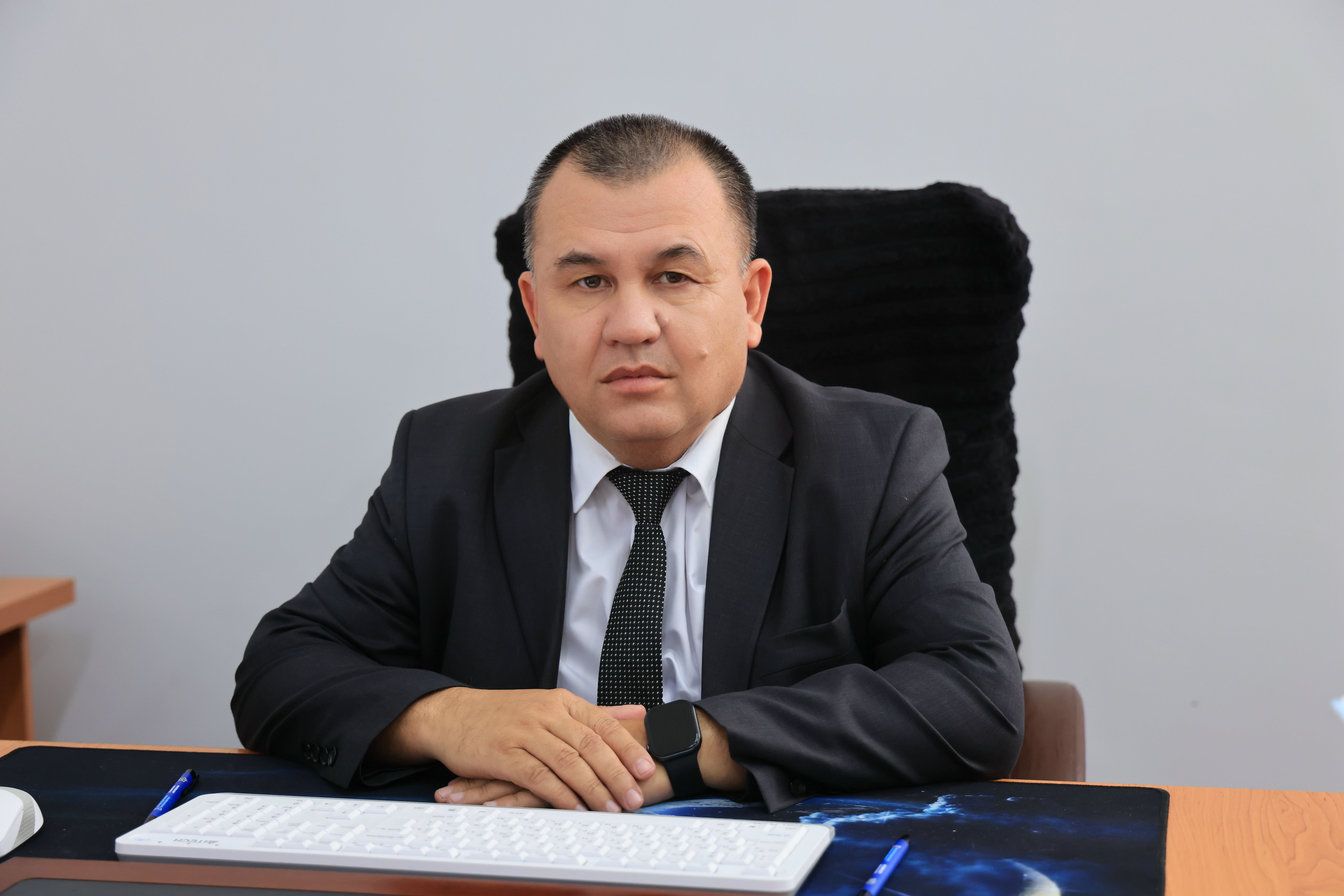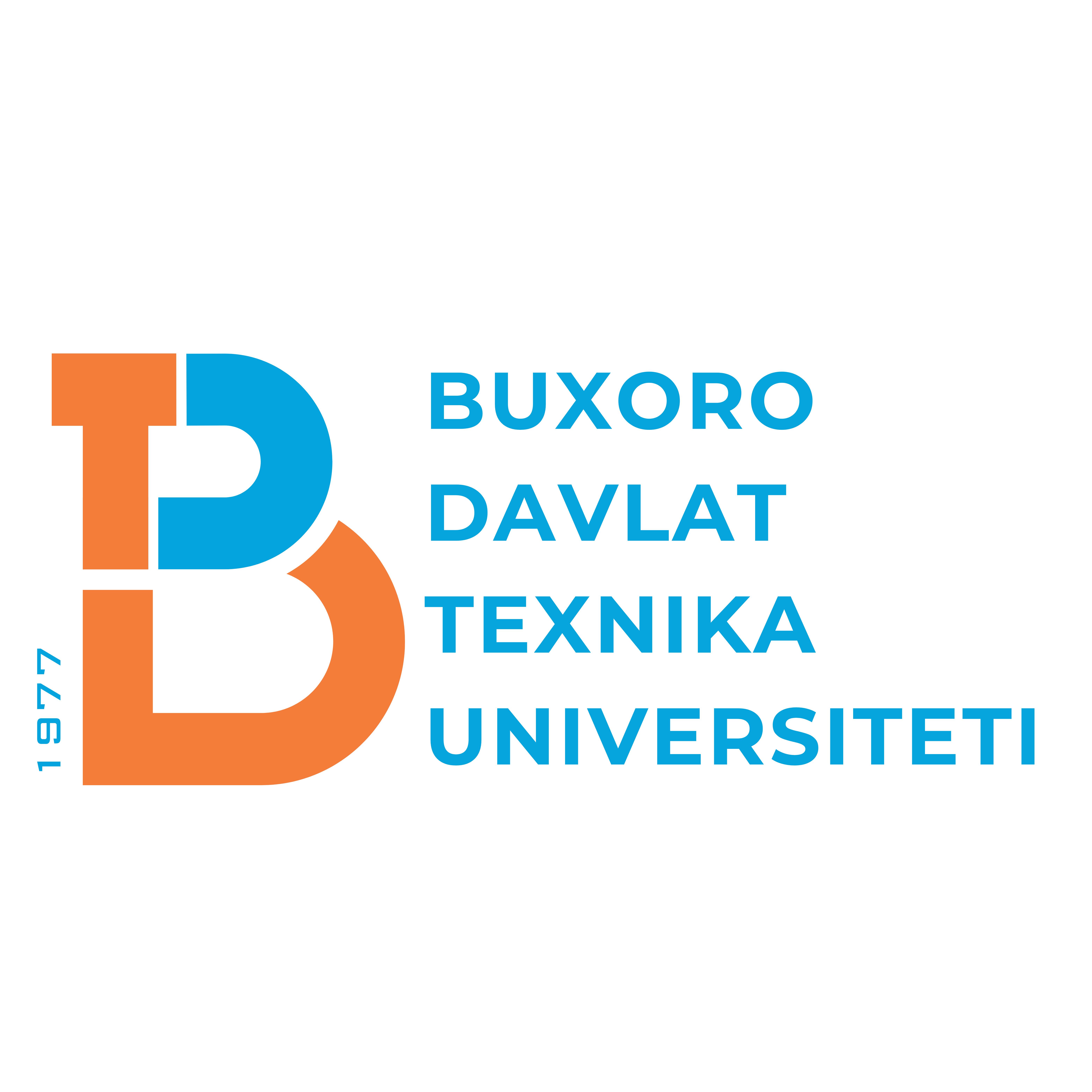
Metrology and standardization
Bosh sahifa Metrology and standardization
Metrology and standardization

Head of the Department of Metrology and Standardization
Tairov Bakhtiyor Boboqulovich
- Qabul vaqti: Monday-Friday (2:00 PM-4:00 PM)
- Telefon: +998 93 471 00 65
- Email: b.toirov@mail.ru
The department began its activities in August 2019 under the new structure of the institute under the name “Department of Metrology and Standardization.” It trains specialists in the bachelor's degree program 5310900 - Metrology, Standardization, and Product Quality Management. The department currently employs 13 professors and teachers, including 1 Doctor of Science (Professor), 6 Candidates of Science (Associate Professors), 1 Senior Lecturer, 3 Assistants, and 2 Trainee Teachers, with a scientific potential of 54%.
Over the past two years, two Doctor of Philosophy (PhD) dissertations have been successfully defended by the department’s staff. Co-authored electronic textbooks (DGU), 5 international (impact factor) textbooks, 3 study guides, 6 monographs, 19 articles in journals, 20 articles in journals from the Higher Attestation Commission (HAC) list, and 5 articles indexed in the Scopus database have been published. Currently, 4 doctoral students and more than 5 independent researchers are conducting scientific research at the department.
The department is implementing a grant project funded by the World Bank through the Ministry of Higher and Secondary Specialized Education — the “Modernization of Higher Education System” program under the Academic Innovation Fund (AIF-2/20), titled “Improving the Quality of Training Qualified Engineering Personnel and Enhancing the Professional Skills of Faculty Members Based on Student-Centered Innovative Technologies in Technical Universities.” Using the project’s funds, laboratory equipment has been purchased.
In addition, virtual laboratories, printed materials, and software have been provided to improve the quality and efficiency of the educational process by enhancing the professional competence of future engineers.
Today, given the rapid development of production processes and the growing demand for measurement accuracy, special attention is being paid to training highly qualified and competitive specialists in the field of metrology, standardization, and certification to meet the needs of industrial enterprises across the republic in the “Metrology, Standardization, and Product Quality Management (Industry)” bachelor’s program at our institute.
|
|
|
|
|
|
|
|
|
|
|
|
|
|
|
|
|
|
|
|
Bachelor’s Degree
60710800 – Metrology and Standardization
60711300 – Metrology, Standardization and Product Quality Management (by industries)
Master’s Degree
70710802 – Metrology, Standardization and Quality Management
Bachelor’s degree:
- 1. Introduction to the field;
- 2. Fundamentals of Metrology (NM, AM, QM);
- 3. Physical foundations of measurements;
- 4. Measurement methods and instruments (EO‘U and A; ITO‘; CBO‘; FKO‘; AO‘);
- 5. Measurement devices, their elements and design;
- 6. Metrological support of production;
- 7. Product quality and statistical methods of quality management;
- 8. Verification and calibration of measuring instruments;
- 9. Fundamentals of conformity assessment (SA; MB and A);
- 10. Evaluation of laboratory competence;
- 11. Engineering of calibration;
- 12. Fundamentals of standardization;
- 13. Technical regulation and standardization;
- 14. Product quality control;
- 15. Quality management system;
- 16. Intelligent measuring instruments;
- 17. Commodity science;
- 18. Product expertise;
- 19. Technology for developing standards and normative documents and their examination;
- 20. Professional psychology;
Master’s degree:
- 1. Methodology of scientific research;
- 2. Theoretical foundations of qualimetry and quality management;
- 3. Theoretical foundations of automated and intelligent measuring instruments;
- 4. The role of standardization and technical regulation systems in quality management;
- 5. Organization and planning of experiments;
- 6. Legal basis of metrology, technical regulation, standardization and certification;
- 7. Patent science, licensing and certification;
- 8. Reengineering;
- 9. Methodology of teaching special subjects;
- 10. Scientific research work and preparation of master’s thesis;
- 11. Scientific and pedagogical work;
- 12. Scientific practice (internship);
List of scientific works published by professors, teachers and researchers of the “Metrology and Standardization” Department: Textbooks, teaching manuals, and monographs
- Hasanova Z.D. “Psychology of Management”. Textbook. 2021
- Akhmetjanov M.M. “Professional Psychology”. Textbook. 2021
- Akhmetjanov M.M. “Methodology of Teaching Special Subjects”. Textbook. 2021
- Urinov U.K., Turobjonov S.M., Amirqulov N.S., Khojjiyev M.Y. “Construction and Operation of Automobile Fueling and Gas Filling Compressor Stations”. Textbook. 2022
- Toirov B.B., Yodgorova M.O. “Fundamentals of Standardization”. Teaching manual. 2021
- Toirov B.B., Alimov A.A. “Design of Measuring Instruments”. Teaching manual. 2021
- Khaydarov Sh.Kh. “Basic Concepts of Food Safety”. Methodological guide. 2019
- Z.Z. Boltaeva “Collaborative Learning — The Philosophy of Cooperation”. Monograph. 2021
- Akhmedjanov M.M. “Modern Pedagogical Practice — A Requirement of the Time”. Monograph. 2021
- Akhmedjanov M.M. “Technology of Organizing Active Teaching Methods in Specialized Subjects”. Monograph. 2021
- Akhmedjanov M.M., Yodgorova M.O. “Organization and Management of Educational Work”. Monograph. 2022
- Sagdullaev Sh.Sh., Majidov K.Kh., Davlyatova M.B. “Technology of Bread and Bakery Products with Medicinal and Preventive Properties”. Monograph. 2022
- Hasanova Z.D. “Psychology of Management”. Textbook. 2021
- Akhmetjanov M.M. “Professional Psychology”. Textbook. 2021
- Urinov U.K., Turobjonov S.M., Amirqulov N.S., Khojjiyev M.Y. “Construction and Operation of Automobile Fueling and Gas Filling Compressor Stations”. Textbook. 2022
- Toirov B.B., Yodgorova M.O. “Fundamentals of Standardization”. Teaching manual. 2021
- Toirov B.B., Alimov A.A. “Design of Measuring Instruments”. Teaching manual. 2021
- Tairov B.B., Alimov A.A., Khojjiyev M.Y., Bozorov U.M. “Design of Measuring Instruments”. Teaching manual. 2022
- Khaydarov Sh.Kh. “Basic Concepts of Food Safety”. Methodological guide. 2019
- Tosheva G.Dj. “Improving the Methodology of Preparing Future Specialists for Design Activities through Practical Teaching”. Monograph. 2023
- Yodgorova M.O. “Using Active Methods — A Requirement of the Time”. Monograph. 2023
- Gaffarov A.Kh. “Technology for Creating Interactive Elements in the LMS Moodle System”. Monograph. 2023
- R.T. Adizov, N.Kh. Qobilova “Technology of Grain and Grain Product Storage”. Textbook. 2023
- Kurbanov A.A. “Methodology of Scientific Research”. Teaching manual. 2023
- Avliyakulov N.N. “Fundamentals of Metrology, Standardization and Certification”. Teaching manual. 2023
- Avliyakulov N.N. “Metrology, Standardization and Certification”. Electronic textbook.
SCIENTIFIC AND METHODOLOGICAL WORKS CARRIED OUT AT THE DEPARTMENT
- Kamalova Mukhlisa Khudoyberdiyevna – Improving the quality control system for food production processes based on international standards.
- Yodgorova Ma’mura Orifovna – Improving the extraction process of coniferous plants using non-traditional influence methods.
- Sayidakhmedov Ravshan Rajabovich – Enhancing the drying process of gluten in locally grown wheat flour using acoustic treatment.
- Shadiyev Sukhrob Sadilloyevich – Improving the system for comprehensive assessment of confectionery product quality.
- Khaydarov Shukhrat Khikmatilloyevich – Developing a promising technology for the production of low-alcohol and non-alcoholic beverages using phyto-additives.
- Azimova Feruza Kamolovna – Methodology for developing future engineers’ professional skills based on a metacognitive approach.
International cooperation activities of the “Metrology and Standardization” Department of Bukhara State Technical University.
A three-year strategic cooperation memorandum was signed between Bukhara State Technical University and M. Auezov South Kazakhstan State University. This document aims to strengthen deep collaboration in education, science, and innovation. Within this framework, both universities’ departments and teaching staff participate in professional development programs, jointly develop educational materials, and supervise PhD and DSc-level research projects. The cooperation is aimed at improving professional qualifications, training scientific and pedagogical personnel, and enhancing the quality of education in these fields.
Based on the memorandum of cooperation signed between Al-Farabi Kazakh National University and Bukhara State Technical University, significant steps are being taken to develop joint research and educational activities with the Department of “Thermal Physics and Technical Physics” of the Faculty of Physics. Within this partnership, a joint master’s degree program has been launched to train specialists in the fields of standardization, certification, and metrology. During the 2025–2026 academic year, applications will be accepted for the program 70710800 – “Metrology, Standardization and Quality Management (by industries).” This two-year program is designed to provide students with in-depth theoretical knowledge and practical skills in modern metrological and standardization systems, international quality management initiatives, and quality control practices across various industrial sectors. The goal of the program is to train specialists who meet international standards and contribute to the regional and global development of the quality management field through innovative approaches.
The “Metrology and Standardization” Department of Bukhara State Technical University builds its activities on the basis of providing high-quality education, conducting scientific research, and contributing to the national economic development.
In forming the department's prospective plans, the reforms carried out by the Republic of Uzbekistan in the fields of science and education, as well as global and regional requirements, are taken into consideration.
The main directions defining the department's future development are listed below:
Training specialists that meet market demands: “Part-time” practical training program
Considering the rapidly changing labor market requirements, the department aims to address the following tasks through the introduction of the “Part-time” practical education system:
• Providing specialists working in industrial enterprises with opportunities to acquire additional professional qualifications;
• Creating opportunities for students to receive quality education during evening hours;
• Making a direct contribution to local industry by training highly qualified practical specialists.
Main objectives:
• Retraining specialists: Organizing retraining courses for specialists working in enterprises in the fields of metrology, standardization, certification, and quality management.
• Practical directions: Providing “Part-time” students with practical lessons, laboratory work, and internships in industrial enterprises.
• Certified specialists: Awarding graduates with certificates recognized by the National Agency for Standardization of the Republic of Uzbekistan.
Expected outcomes:
• Preparing qualified personnel for local enterprises;
• Enhancing the professional level of specialists;
• Training specialists with practical knowledge that meets labor market needs.
Improving the quality of education:
• Developing textbooks and study guides: Encouraging the creation of educational and methodological manuals that include the latest information in the field of modern metrology and standardization.
• Implementing open educational resources: Providing students with opportunities for distance learning through electronic educational materials.
• Programs compliant with international standards: Increasing the level of international recognition by aligning educational programs with the Bologna Process.
Development of scientific research:
• Modern research in metrology: Conducting in-depth scientific studies in measurement instruments, accuracy standards, certification, and quality management.
• Student involvement in research: Engaging students in research activities (R&D), graduation qualification projects, and conferences.
• International cooperation: Strengthening collaboration with foreign universities, institutes, and metrology centers.
Strengthening the ICT infrastructure:
• Upgrading laboratory equipment: Equipping laboratories with modern measuring instruments, calibration stands, and certification tools.
• Simulation software: Expanding the use of software for modeling metrological measurement processes.
• Creating an e-portal: Introducing an information portal for managing educational processes, monitoring departmental activities, and improving communication with students.
Training specialists in information security and quality management:
• Training experts in quality management systems: Preparing specialists based on international standards such as ISO 9001, ISO/IEC 17025, and ISO 14001.
• Advanced training in information security: Establishing courses in information security considering industrial digitalization processes.
Cooperation with local industry and business:
• Expanding internship bases: Organizing internships in metrology laboratories of industrial enterprises.
• Retraining of specialists: Conducting retraining courses in certification, standardization, and measurement methods for specialists working in enterprises.
• Project-based cooperation: Implementing joint innovative projects and grants with enterprises.
Raising the level of international training:
• Participation in international grant programs such as Erasmus+, Tempus, and Fulbright: Ensuring academic mobility of teachers and students through international programs.
• Involvement of foreign experts: Engaging international specialists, professors, and researchers in educational and scientific activities.

















